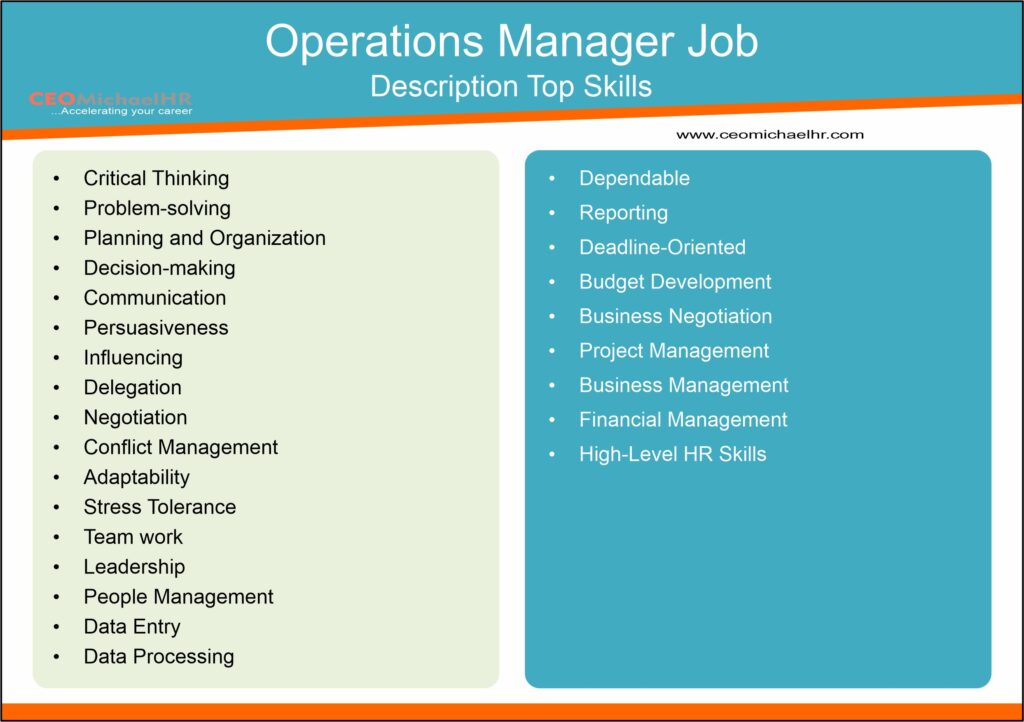
New clients, unlock 10% off all plans 🔥 at checkout with code: CEO10SPECIAL (Limited Time Offer)
New clients, unlock 10% off all plans 🔥 at checkout with code: CEO10SPECIAL (Limited Time Offer)






An Operations Manager usually have a niche in companies that offer products and services.
They play an important role in the area of operations and production within a company.
The operations manager job description defines the major tasks, duties and responsibilities of an operations manager.
The main purpose of an operations manager is to plan, direct operations, improve productivity and efficiency as well.
Other job roles expected of an operations manager centers on the conscious monitoring of existing processes and its effectiveness.
What an operations manager does may vary depending on the company or industry they work.
For instance, an operations manager can fill a pivotal role in a business, government or other organizations.
The actual tasks of an operations manager depends on the nature and size of the organization. However, a wide range of business and interpersonal skills are required to attain success.
A business operations manager develop plans and organizes the day-to-day activities of a business, government agency or non-profit organization.
They oversee a variety of departments from human resources to accounts payable.
Special duties of a business operations manager may include monitoring expense reports, reviewing budgetary information, coordinating educational assignments for member staff, performing cost-benefit analysis on internal programs and interpreting financial data.
You might like: Senior Business Analyst Job Description
The stability and growth of a business is highly dependent on an operations manager.
Job openings for operations managers can be found in just about any government agency, company and industries such as transportation, retailing, insurance, healthcare, construction, hospitality, and manufacturing industries to mention a few.
Coordination and Supervision
Financial
Best Practices
Human Resources
Production
Communication
Sales, Marketing and Customer Service
Strategic Input
You might like: Unemployment Guide: 9 ways to make the most of unemployment
A well-tailored operations manager resume must highlight your relevant skills for an operations manager position.
The skill section will help your resume to match the applicant tracking system (ATS), which is your first move to get your application recognized by the hiring bots.
Make use of these operations manager job description top skills below to help you create your top-notch resume in a brace.
You might also like: The Predictive Index Test (All You Need to Know)

You might like: 15 key skills to put on a resume right away
The education and experience requirements for an operations manager varies according to the nature of the job responsibilities.
However, the following are commonly required in the operations manager role.
Do you wish to work as an operations manager but unsure of the effectiveness of your resume?
Our team is ready to supercharge your job search by tailoring a custom resume that land interviews 3x faster.
Reach out to our experts at CEOMichaelHR where your tailored resume advances from hello to hired!
Share
Further Reading
*The names and logos of the companies referred to in this page are all trademarks of their respective holders. Unless specifically stated otherwise, such references are not intended to imply any affiliation or association with CEOMichaelHR.
Land interviews 3x faster while submitting fewer resumes
Copyright © 2025, ceomichaelhr.com.
All rights reserved.
Land interviews 3x faster while submitting fewer resumes
Copyright © 2025, ceomichaelhr.com.
All rights reserved.

Learn the same techniques our expert resume writers have used to get thousands of clients closer to their next job
Unlock expert resume tips, start landing multiple interviews!

Stay connected to receive powerful career insights, updates, and inspiration that’ll help you hit your career goals.